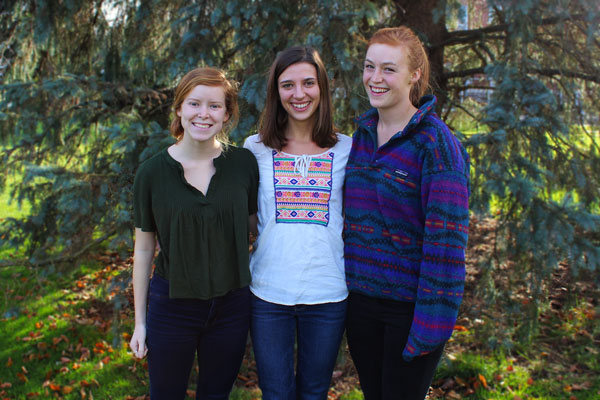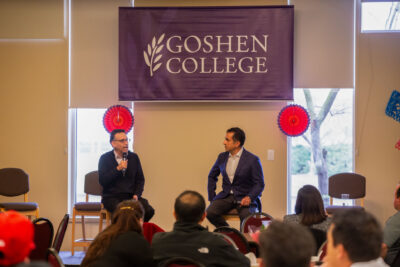Ellen Conrad, Kayla Gray and Morgan Short, all seniors, and Phil Mason, executive director of graduate and continuing studies, joined over 500 participants at the “Greening the Statehouse” conference to discuss environmental injustices in Indiana on Nov. 19.
The seniors, all passionate environmentalists, heard about the conference through an email from Goshen College club, EcoPAX, just a few days before the event took place.Gray, an environmental science and sustainability major, has finished taking all of the classes required for her major and missed learning about the environment.
“Last year, I did the sustainability leadership semester at Merry Lea,” Gray said, “and since then I haven’t been able to do anything related to environmental science. This was a way to get involved with the issues and a way to rekindle the passion I have for the environment.”
The conference touched on a variety of different environmental injustices happening in Indiana and the Midwest.
The keynote speaker, Melissa Mays, spoke about living in Flint, Michigan and the impacts of the lead-water crisis. Flint was declared to be in a federal state of emergency from January to August. Mays has been an advocate for Flint during this crisis since July 2014, after the city switched water sources.
During her lecture, Mays explained how the crisis affected her family. Problems with rashes, weak bones and constant sickness became the norm for Mays and her three boys after Flint switched their water sourcing from the Detroit water system to the Flint River.
“[I learned] how serious lead poisoning is and insights of what life would be like [with] not being able to use the water on your land,” Gray said.
Besides the keynote speaker, participants heard from panelists about climate change, as well as how Indiana plays a role in environmental issues.
“I think [the conference] is really important for Indiana because…we really ignore environmental issues,” said Gray. “It’s really important to work towards making more environmentally sustainable policies.”
Conrad said, “I loved leaving with a better understanding [of] the environmental concerns specific to Indiana (like health concerns related to toxins from old industries and agriculture) and the type of efforts that are currently in motion to remedy them.”
Gray mentioned that the yearly conference was a great place to gather with other environmentalists and discuss injustices as well as a great place to network. People from all over Indiana, young and old, went to the conference to learn about sustainability and how to end injustice against the environment.
So would Conrad recommend the conference to others?
“No matter what your major is or your interests are, there are always common ideas that people can relate to around the environment,” Conrad said. “Who isn’t interested in the value of clean water and air? Who is completely unconcerned about the accessibility to safe living conditions and a secure future for our children? There are plenty of ways to create divisions, but it’s more important to find connections and work together.”



